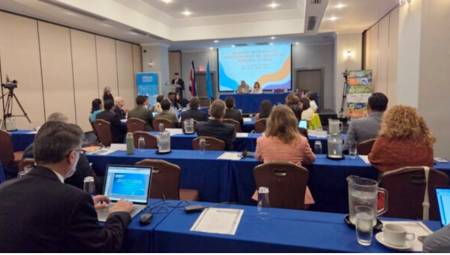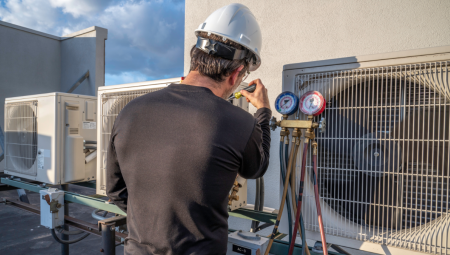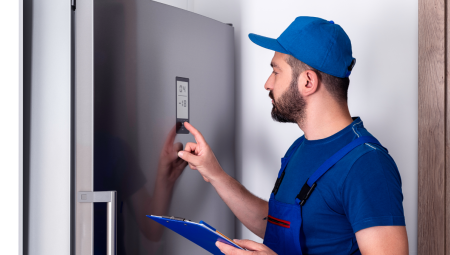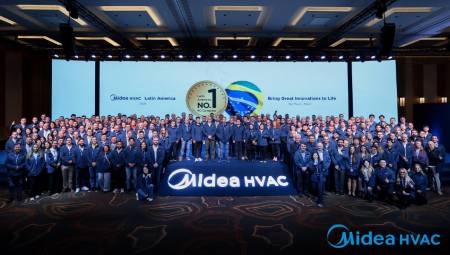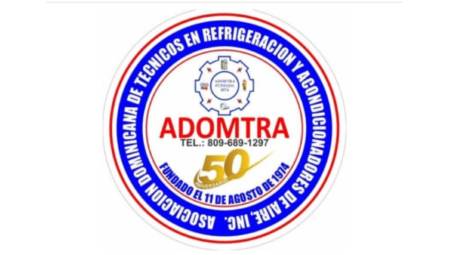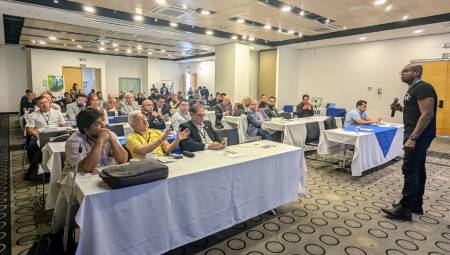 Last part of this topic that deals with how to design, install, operate and maintain high performance air conditioning systems.
Last part of this topic that deals with how to design, install, operate and maintain high performance air conditioning systems.
by Camilo Botero*
After having developed the theme of high performance air conditioning, phases of a project, the concept of bEQ (Building Energy Quotient) and the optimization of air conditioning using the main novelties of the industry, we will now analyze processes such as the construction phase, the occupation, operation and maintenance phase and the final report.
Construction phase
The objectives of the commissioning process during the construction phase should be defined through precise meetings and communications and quality assurance documents updated. The review of verification documents is also necessary: checklists and test procedures. Another activity is to define the training needs and verify the construction activities, and prepare for delivery to the owner of the work.
It is necessary to verify that the specifications of the construction do meet the Requirements of the Owner and for this these conditions are required:
- Verify the training of the owner's staff.
- Check the manual of the systems.
- Update the owner requirements and commissioning plan.
- Facilitate communications.
- Update the design bases.
- Update the owner's requirements.
- Update the commissioning plan.
- Implement checklists and testing procedures.
- Implement the training plan.
- Prepare the manual of the systems.
The commissioning team is the means for effective communications and finally obtain the acceptance of the owner, through official meetings and through the skillful use of the Work Log. The members of the commissioning team in this phase are the commissioning management, the owner's representative (Project Manager, operation and maintenance personnel), the representatives of the design team (including specialized consultants, the representatives of the contractors (including subcontractors, especially the adjustment and balancing professionals and those of controls) and the representatives of the brands of the most important equipment. important, who will review again the following:
- Owner requirements: update according to the owner's orders.
- Design bases: update according to changes in the owner's requirements.
- Checklists for construction: finalize and implement.
- Test procedures: Finalize and deploy.
- Systems Manual: complete and verify.
- Work log: use
- Commissioning plan: update and expand.
The purpose of verification is not to provide the contractor with free quality control services, but to provide the owner with assurance that the requirements specified by him are being met. AsHRAE standard 202 emphasizes the recommendation to do a strategic sampling where the frequency of the sample will be established by the Commissioning Management.
This is a very controversial issue so commissioning management must establish it accurately. If deviations are found during sampling, responsibilities are established; it is a question of correcting them and if it is not possible, the activity is rejected. The financial responsibility for these reprocesses must be contractually defined.
The owner's requirements for the project are set, such as the benchmark against which verifications must be made, but generally contractors are bound by the contract documents and not by the owner's requirements. If there are deviations from the contract, these are relatively easy to correct, but if the deviations are presented with respect to the owner's requirements and are not in the contract, the matter is more complicated.
Contingencies to resolve conflicts of the previous nature must be discussed and taken into account. In theory, in the verification of design documents, the requirements of the project owner should prevail, versus contractual ones.
Elements of the construction checklist and test procedures involving starting or activating an appliance must be made by contractors under the observation of the commissioning team and other interested parties. The verification of such activities would be based on witnessing the grubbing-ups and developing the test and start-up protocols and documenting them.
The verification of documents, such as the system manual, are usually accompanied by the review of the commissioning team. The verification of the training must be carried out in person, with exams and / or interviews. Commissioning management verifies that a specific sample meets the expectations of quality and quantity that appear in the owner's requirements and verification is done to look for problems and minor deviations that can be resolved via the log of the work, but major deviations require concerted action with the commissioning team. The owner is responsible for the final acceptance of deviations that impact their requirements.
Commissioning management does some checks, supervises others, and verifies that it meets the owner's requirements for quality and quantity, as listed in the construction documents. Its function is to detect problems, and deviations are corrected via work log or meetings with those involved. The owner reserves the final responsibility for the acceptance of the solutions. The commissioning team supervises the selected tests and verifies that the test procedure is complied with.
tags.
The commissioning team supervises the selected trainings and verifies that the training activities are fulfilled according to the commissioning plan. The search for possible shortcomings in training is being sought. Minor and major deviations are corrected as explained above. The final responsibility for accepting these trainings will be the owner.
Systems Manual: the commissioning team verifies that the systems manual is complete in accordance with the commissioning plan. It is in the search for possible deficiencies in the documentation that must appear in said manual. Minor and major deviations are corrected as explained above. The final responsibility of acceptance of this manual will be made by the owner.
Occupancy, operation and maintenance phase
The objectives of the commissioning process in the occupation & operations phase must be clearly defined. This is defined by the commissioning team, among them are:
- Update of commissioning documents.
- Lessons learned workshop.
- Final report of the commissioning team
- Close the commissioning process.
- Prepare the owner for a long-term use of the facilities where the project was carried out.
- Complete the tests specified for this phase of occupation and operations.
- Minimize after-sales calls to contractors and suppliers.
- Document lessons learned
- Provide assistance during matters concerning guarantees.
- Provide assistance with accompaniments to the operations of the installation so that they meet the Requirements of the owner.
- Formally close the process, by means of a certificate of delivery of the Project to the Owner.
- Coordinate calls to contractors.
- Verify the tests that were left for this phase.
- Check the training during this phase.
- Ensure that the manual of the systems is complete, careful and accessible.
- Update the requirements and the commisionning plan for archiving.
- Close the work log and deliver it to the owner.
- Do a workshop on lessons learned.
Complete and deliver the final report of the commissioning process, owner requirements and design bases:
- Keep in mind what and update if necessary:
- Training materials: incorporate them into the manual of the systems.
- Systems manual: verify and use.
- Work log: close and archive in an easily accessible site.
- Commissioning plan: update.
- Develop and deliver the final report of the commissioning process
- Although most participants are ready to move in this phase, everyone can benefit from this exercise.
- The owner can benefit from the information received and compare the results with their initial requirements.
- The design team would benefit from comparing their design criteria with the results.
- Likewise, contractors can see how their assemblies are performing.
- And commissioning management can benefit from all these experiences, for future projects.
Final report
- Identifies any system or assembly that does not perform in accordance with the owner's requirements and notes the ramifications of such deviations.
- Evaluates the operating conditions of systems and assemblies after testing is complete.
- Summarize the contents of the log.
- Defines the project benchmarks.
- Write down lessons learned.
- Ideally, it highlights the benefits of the commissioning process.
- Without accusing, it shows the problems solved and the costs abolished, improved performances etc.
Epilogue
Finally, I want to leave the following reflections regarding quality assurance in an air conditioning project, because even if all those involved in said project have clear their own functions, they must adopt this methodology that will undoubtedly benefit them greatly.
1. The Owner can benefit from the information obtained from the various parties involved who relate the deliverables, with their requirements, wishes and specifications.
2. The design team can benefit from the issues that relate the design processes to the implementation of the same in the construction phase and verify if their premises and assumptions were met, especially in the occupation, operation and maintenance phase.
3. Contractors can benefit from the issues that relate the construction processes and equipment used even from them in the construction phase and verify if their processes and techniques were met, especially in the occupation, operation and maintenance phase.
4. The ASHRAE standard 202 is a methodologically very convenient and easy-to-follow guide to achieve high-performance HVAC projects. Its use is recommended.
* Camilo Botero is the current Secretary of the Federation of Ibero-American Associations of Air Conditioning and Refrigeration - FAIAR; he was president of ACAIRE and is president of Camilo Botero Ingenieros Consultores Ltda. He has worked as a teacher in several Colombian universities, guilds and currently in ACAIRE in diploma courses of air conditioning projects, energy efficiency in air conditioning and refrigeration, cogeneration and trigeneration, applied psychometrics, thermodynamics, fluid mechanics, heat transfer and turbomachinery. ([email protected]).




